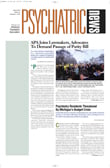In addition to its new Focalin, Novartis Pharmaceuticals is awaiting final approval for an improvement to its long-acting formulation of methylphenidate, Ritalin-SR (
see story above). The new Ritalin-LA received its “approvable” notice from the FDA in October. The company expects final approval shortly after the first of the year. It is just one of several developments in the treatment of ADHD.
The new Ritalin-LA is a microbead-technology formulation developed for Novartis by Elan Pharmaceuticals. Each capsule contains 50 percent immediate-release beads and 50 percent extended-release beads. Its efficacy and side-effect profile were shown in company-sponsored clinical trials to not be statistically different from methylphenidate immediate-release multiple dosing.
Noven pharmaceuticals is in the late stages of development of its novel once-daily transdermal methylphenidate system. MethyPatch imbeds methylphenidate into the adhesive used in the skin patch, providing sustained release as long as the patch is worn. It is designed to offer the safety and efficacy of oral immediate-release methylphenidate while eliminating the need for dosing during the school day. In addition, it offers the flexibility of immediately discontinuing dosing of the drug through simply removing the patch. Noven is undertaking a supplemental Stage III clinical trial at multiple centers across the U.S. and hopes to file a New Drug Application (NDA) in the second half of 2002.
Eli Lilly and Company last month filed an NDA for its new ADHD treatment, atomoxetine. The drug will be the first nonstimulant treatment available for ADHD, if approved. The compound appears to be well tolerated in company-sponsored clinical trials, and its efficacy is roughly equivalent to standard stimulant treatments. The new drug is a potent inhibitor of norepinephrine reuptake. Common side effects associated with the drug are headache, abdominal pain, nausea and vomiting, anorexia and weight loss, nervousness, somnolence, and insomnia. In a head-to-head comparison of atomoxetine and methylphenidate, a significantly higher percentage of patients taking atomoxetine experienced vomiting and somnolence than did patients taking methylphenidate.
Each of the products, if approved, would add another option to the arsenal of medications available to augment educational, behavioral, family, and parenting interventions that make up a comprehensive treatment program for ADHD patients.
